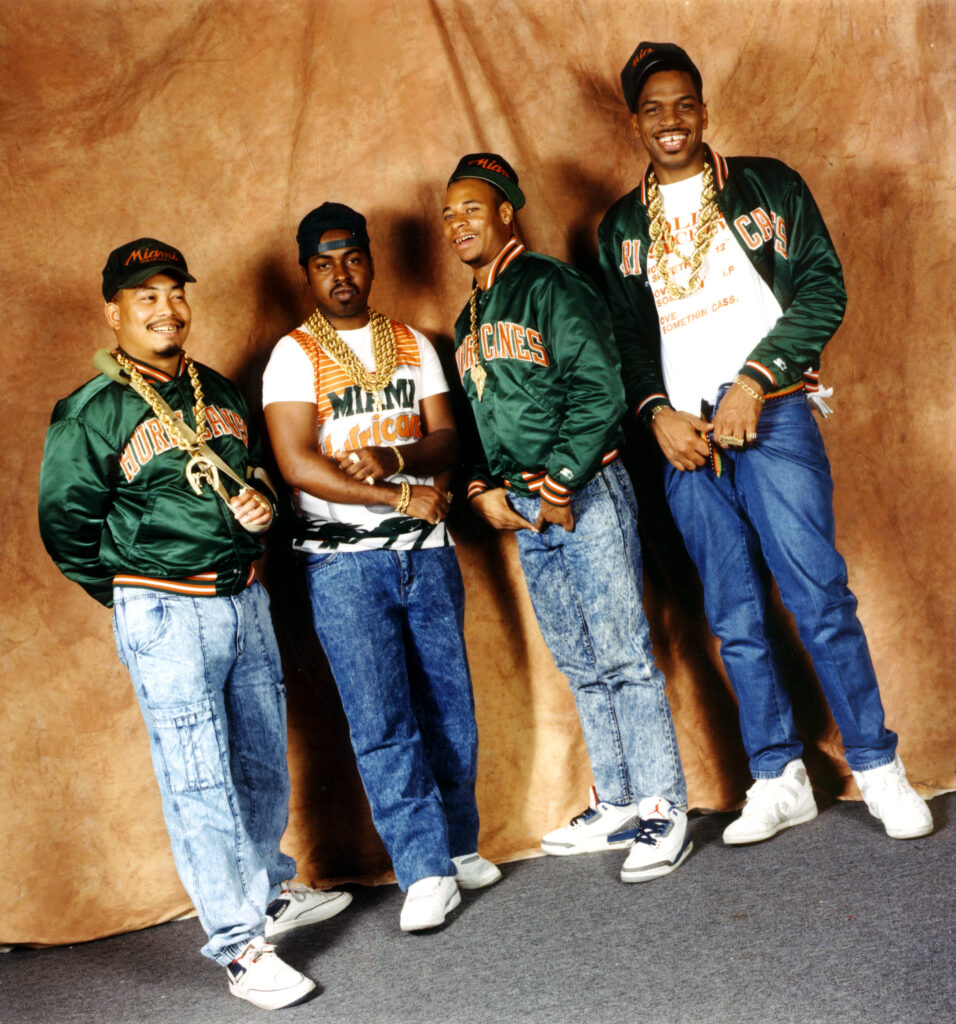2 Live Crew’s reputation was unlike any rap group before or after them. The quartet made the lyrics of MCs such as N.W.A. or 50 Cent seem tame. The Miami group was well-known for their improper and sexually implicit lyricism, leading to arrests and fines. In 1987, a record store clerk was even charged with a felony offense for selling 2 Live Crew’s debut album to a 14-year-old girl. The predicament spoke volumes about how offensive 2 Live Crew was then. Ultimately, their refusal to compromise positively changed hip-hop for good. As Rock the Vote’s Ashley Spillane put it, “It’s tough to imagine a similar effort even gaining support today, let alone getting to the point of banning albums and arresting artists for performing their music. That’s a direct result of young people exercising their political power.”
In fact, a few counties in Florida attempted to outright ban their 1989 album, As Nasty As They Wanna Be. Even the simple prospect of performing their music was dangerous, with its members frequently being arrested during live acts. Their arrests spurned much controversy over space in areas beyond hip-hop. It raised a philosophical question surrounding the validity of the First Amendment. How far did the amendment go in solidifying freedom of expression? Seemingly enough, the First Amendment was taking a backseat in favor of court rulings that deemed 2 Live Crew’s lyricism as overtly offensive.
2 Live Crew Were Known For Their Verbal Obscenity
However, 2 Live Crew’s wild adventure onto the front steps of the Highest Court in the Land was for a slightly different issue. In 1989, 2 Live Crew released a non-explicit version of their hit album in the form of As Clean As They Wanna Be. The clean version served two purposes. Firstly, the record expanded the group’s audience beyond the federal bans thrown on them. In addition, the release was a slap in the face to the bureaucrats who wanted to see 2 Live Crew erased from hip-hop. As a part of As Clean As They Wanna Be, they recorded a parody of Roy Orbison’s “Oh, Pretty Woman.” The collective contacted Acuff-Rose Music for permission while promising royalties and credits. However, Acuff-Rose would sue 2 Live Crew a year later.
Eventually landing in the Supreme Court, 2 Live Crew had shockingly ended up there for copyright violations rather than verbal obscenity. Ultimately, the group would win Campbell v. Acuff-Rose Music. The victory was significant for hip-hop as a whole, solidifying the idea that there shouldn’t be limits to creative expression. The court deemed the parody of “Oh, Pretty Woman” as “a comment on the naiveté of the original of an earlier day, as a rejection of its sentiment that ignores the ugliness of street life and the debasement that it signifies.”
They Enforced Creative Freedom In Hip-Hop

2 Live Crew’s lasting influence on creative expression exceeded their chart numbers. Back in the 1980s, artists were beginning to express their creative sides more clearly than ever before. Madonna was rolling around stage while vocalizing “Like a Virgin” on MTV’s Video Music Awards. Prince and the Motley Crue pushed controversial boundaries regarding their experiences with sex or violence. However, parents were worried about the impact of the subjects on kids. All of a sudden, hip-hop had begun to enter the political sphere. By the end of 1985, The Recording Industry Association of America deemed it would include “Parental Advisory” labels on albums it determined needed them.
However, the ruling wasn’t enough for Florida activist Jack Thompson. Marveling at 2 Live’s As Nasty As They Wanna Be, he was trying to eliminate the flamboyant Miami group. All of a sudden, the government was blockading creativity like never before. Nicki Minaj, Miley Cyrus, and the Eminem’s of today were under threat to never exist in the first place. However, 2 Live’s victory in Campbell v. Acuff-Rose Music hushed suffocating political activists for good. The case didn’t directly surround freedom of speech. However, it silenced future detractors from attempting to limit the creative freedom of artists. In addition, it set the precedent that The First Amendment was King regarding creativity.
The post Black Music Month: Revisiting 2 Live Crew’s Controversies appeared first on HotNewHipHop.
